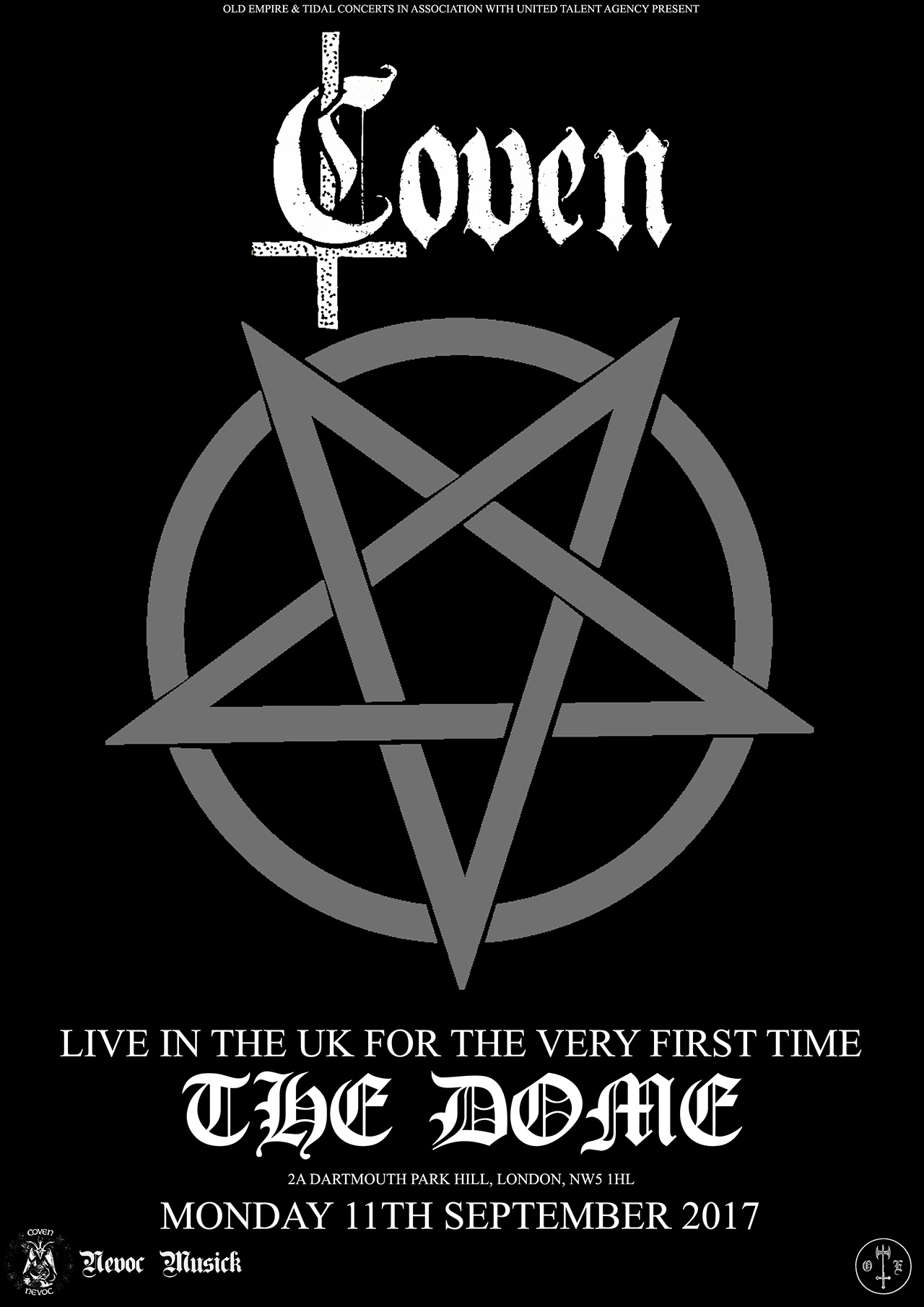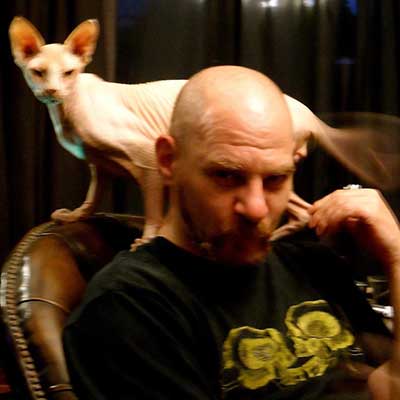Coven, the recently resurrected band whose scandalous 1969 album Witchcraft Destroys Minds And Reaps Souls laid the foundations for occult rock and much more besides, have announced that they will playing UK for the first time in the history, bringing their diabolist and delirious energies to The Dome in north London on September 11.
Forged in 1968 at the behest of singer Jinx Dawson drummer Steve Ross and bassist Oz Osbourne just as the era of peace and love’s death throes were mutating and manifesting darker forces, Coven drew from the liberating nature of the scene around them and took it into new realms of devotional fervour, their theatrical live shows, treated as devout Satanic rites and gathering forces that would rampant through their still startling debut.
Tony Iommi may have pleaded ignorance in a 1986 TV interview when presented with a copy of Witchcraft…, featuring the opening song Black Sabbath and the curiously named bassist, but while Sabbath and Led Zeppelin were leafing through Aleister Crowley texts and Dennis Wheatley novels in the early 70s, across the Atlantic, these dedicated practitioners of the Left Hand Path were already walking it like they talked it, generating scandal, wonder, and the source material for four decades of occult-steeped rock in the process.
With Jinx still at the helm and a new brood of adepts admitted to line-up Coven are stoking the fires once more that have already burned at Roadburn in the Netherlands, Sweden’s Muskelrock festival and Northwest Terrorfest in Seattle. Below, Jinx talks about the long road that’s led to her first live appearance on these shores.
How have the new shows differed from the ones you played in the late 60s?
“I think the new audiences know what to expect. The old audiences had no idea what to expect, because obviously there wasn’t any occult rock at all when we started, so it was like seeing a horror movie for the first time. But now the audiences know the words to every song, they expect certain things, and that’s kind of nice, because it’s become easier.”
There must have been a thrill of having that shock value back then too.
“Well, that was the whole point of doing the whole thing, the shock value. Nobody was doing it. But there would be no applause, and we would think, ‘We’d better get the hell out of here, they’ll kill us’, because that was pretty much the hippy days. But then all of a sudden, five minutes later the whole place would burst into applause, and it took them that long for it to sink in what the message was and what we were doing, so that was a thrill.”
You must have been changing people’s consciousness back then.
“Absolutely. It was just unheard of back then. Now it’s ubiquitous, look at all these bands now, there’s hundreds of them and back then there were none. Alice Cooper wasn’t even there yet. We use to play with him a lot, and it was still a glam band. So the audiences had never really seen anything like it and it was fun to do that, and I kind of would like to do that again, but they’ve seen all this stuff, they’ve seen the sign of the horns, they’ve seen the inverted crosses, they’ve already seen it but what can you do. If you’re the first, that’s just the way it goes.”
You’ve always said you were the first to use the devil horns in a musical context. How did you react when Gene Simmons tried to trademark the gesture?
“Hahaha, well he’s always good for a laugh. I hope people realise where it originated from because I don’t really like it when people try to change history and I know I’ve been hidden for a long time, but that doesn’t mean you can change history.”
Have you found playing these shows have been a good reminder for people?
“I hope so, but it does seem that there are a lot of people who are not wanting to accept it because they grew up with these people. They grew up with Dio, they grew up with Kiss, Coven kind of went into hiding, so during most of the 70s and beyond, all these bands came up and people had no idea that somebody did all of this before.:
Have the more recent bands given Coven their dues?
“Well the younger bands do seem more respectful of the situation and where things came from. Back when we were starting in ’67, ’68 and on through the early 70s, band were stealing here, stealing there, and that was just the colour of the situation, and you have to remember, there was no internet, so if you didn’t get a story in a major publication, nobody knew any different. Like with Dio, my original drummer was in Rainbow for a couple of weeks and then Cozy Powell took over, and we knew Ronnie back from then, and he always used to use the sign of the horns and he always used to ask what is that, we told him it was the sign of recognition from one Left Hand Path practitioner to another, and all of a sudden we kind of fade out of the limelight and all of a sudden he’s doing it and they were getting the recognition for it. I’m not trying to take anything away from Ronnie, we were friends, but it is a little irritating that he actually never came across and said something. He said his grandmother did it, and I do agree they have a similar sign in Italy, the hex, but that is not the same as the sign of the horns, which is raised up high. It bothers me when people get those mixed up, but what can you do?”
The first shows with with the new line-up feel like they’ve been a long time coming. Do you feel as though this is an opportunity to reset the purpose of Coven?
“I do, because there’s a difference between an artist making music and the music business, and the music business has never been very kind to Coven. They constantly wanted other bands to take over when we did the Witchcraft… album and the situation with Black Sabbath coming up, being on the same label, and even some of the songs were from the same publishing company. They didn’t feel like a young girl should be fronting a band like that, and they didn’t like the fact that it was too realistic for them.
“The executives wanted to water it down a bit, so that it wasn’t as realistic, because I come from an old lineage of Left Hand Path people and that’s why I wanted to do this. Witchcraft… was supposed to be a scholarly work but it became a commercial success, and then even when I moved out to LA with the band, the label constantly wanted to change it to some kind of pop situation, like ‘Maybe we’ll make her into a blonde Cher’. It makes me feel mad when I feel like they let other bands do what they wanted to do, and we never really got to do that. So that did impede the live performances and the records coming out. So finally I got so disgusted with this, and now that’s it’s so accepted, nobody’s really going to target me or mess with me, so that’s why it took a long time to come out and play live. It’s a shame, because we were still trying the whole time. That’s the why life goes sometimes. You put out something there that’s… it’s like my great aunts told me, ‘You’re going to have problems with this’, and they were right.”
How has it been to play the recent shows? At Roadburn your voice sounded as strong as ever.
“To tell you the truth, these songs, especially the ones they like so much from the Witchcraft… album, I was 17, going on 18 when I started recording it, and I was at the peak of my operatic voice. I was into opera, I had a scholarship to operatic college, and made it really it really hard for myself in the future because those songs are so difficult to sing. I don’t know if anybody realises that, but they’re operatic songs, so coming out again after so many years and trying to sing them, it’s really difficult, so I’m doing the best I can, trying to make them sound as much like they did before. I hope I can come across with that. I know some of the higher notes are kind of hard to sing now, but I hope I can do them justice anyway. I know the feeling is there for sure, it hasn’t changed. It’s like I was onstage in 1968, which I found really odd, I didn’t feel like time has passed at all. But it was a good feeling.”
Coven play The Dome in London, hosted by Old Empire and Tidal Concerts. Get tickets here!


